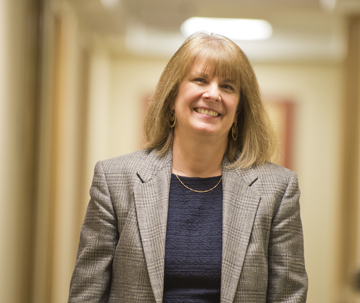Purdue Profiles: Ann Christine Catlin
April 22, 2014
 |
|
Ann Christine Catlin, senior research scientist in ITaP. (Purdue University photo/Steven Yang) |
Ann Christine Catlin and her team create databases that are quietly revolutionizing the way researchers examine some of the world's most pressing topics, from cancer to pediatric HIV.
Catlin, a senior research scientist in ITaP, works with a wide range of partners nationally and internationally to create complex databases that allow scientists to explore, visualize and access the data that drives their projects.
What are the details of these databases?
We build the databases on HUBzero, which is a Purdue-created platform designed to support complex, high-demand computing. Researchers across the world, including all of the researchers working on projects for which we build databases, have access to HUBzero.
We build a wide range of databases for projects across all disciplines. Essentially, a research group will write a grant proposal that includes our involvement, and when the project is funded, we work with them to create a database with all the functions they need.
So far, we've built 30 such databases. We built the first one in 2009 for the Cancer Care Engineering project, which involves a network of investigators across Indiana. The database contains information related to biomarkers and analysis data for colorectal cancer.
What are some other examples of databases you and your team have built?
We recently worked with Yale University to create a database for the International Thymic Malignancy Interest Group, which works to advance understanding and treatment of cancer of the thymus, an organ that's part of the immune system. Before our database existed, there was not a wide set of collected data available about this rare cancer.
Our database includes information from 8,000 thymic cancer cases worldwide. Now, researchers have a central place to go when investigating questions about this deadly disease.
We built another database in conjunction with the Yale School of Medicine and two teaching hospitals in Ghana. That database collects data about cases of pediatric HIV. Researchers in that project use the data to develop psychosocial interventions that they hope will lead to improved rates of medication adherence, among other things.
What's it like building databases for such different and complex projects?
It's exciting because it requires us to constantly learn. Every project we complete teaches us how to improve our data technology.
Further, one of our challenges is that we're dealing with very different types of research. For example, an ongoing project deals with epigenetic changes that happen during breast cancer -- and we don't know much about genes.
Building these databases requires us to learn about our researchers' data so we can understand their needs, which are always very specific. Once we understand each other, though, we can make fast progress.
Who are the other members of your team?
Right now there are five others working on our ongoing projects, but that number varies because we involve graduate students. Our team now includes two Purdue graduate students and consultants based around the world. The global nature of our team is a neat reflection of the worldwide implications of the data we're using.
What other projects are you working on?
In the past year, we've created a way for researchers with access to the Network for Earthquake Engineering Simulation hub (NEEShub) to create their own simple databases using our system. Soon, we hope to roll out this feature for researchers involved with all of our hubs.
How does it help researchers to have access to the databases you create?
First of all, it creates a collaborative environment for researchers to manipulate and study vast amounts of data that will enable their work. It also provides a platform for researchers to collaborate, because they can talk to each other using their hub's forums.
Being able to explore data in really sophisticated ways -- beyond ways that have been available in the past -- is key for investigators because it's the way they answer their research questions.
It's also exciting for us, because our goal is to serve and expedite their research needs, and we've had exceptional success. In the end, we know we're helping them make important discoveries with huge implications. That's very gratifying.
Writer: Amanda Hamon Kunz, 49-61325, ahamon@purdue.edu
